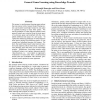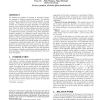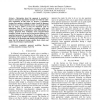62 search results - page 2 / 13 » Learning and Exploiting Relative Weaknesses of Opponent Agen... |
ATAL
2011
Springer
12 years 4 months ago
2011
Springer
We develop an algorithm for opponent modeling in large extensive-form games of imperfect information. It works by observing the opponent’s action frequencies and building an opp...
IJCAI
2007
13 years 6 months ago
2007
We present a reinforcement learning game player that can interact with a General Game Playing system and transfer knowledge learned in one game to expedite learning in many other ...
ATAL
2006
Springer
13 years 8 months ago
2006
Springer
We address the problem of learning in repeated N-player (as opposed to 2-player) general-sum games. We describe an extension to existing criteria focusing explicitly on such setti...
IAT
2009
IEEE
13 years 8 months ago
2009
IEEE
Information about the opponent is essential to improve automated negotiation strategies for bilateral multiissue negotiation. In this paper we propose a negotiation strategy that e...
ATAL
2008
Springer
13 years 6 months ago
2008
Springer
The application of reinforcement learning algorithms to Partially Observable Stochastic Games (POSG) is challenging since each agent does not have access to the whole state inform...



